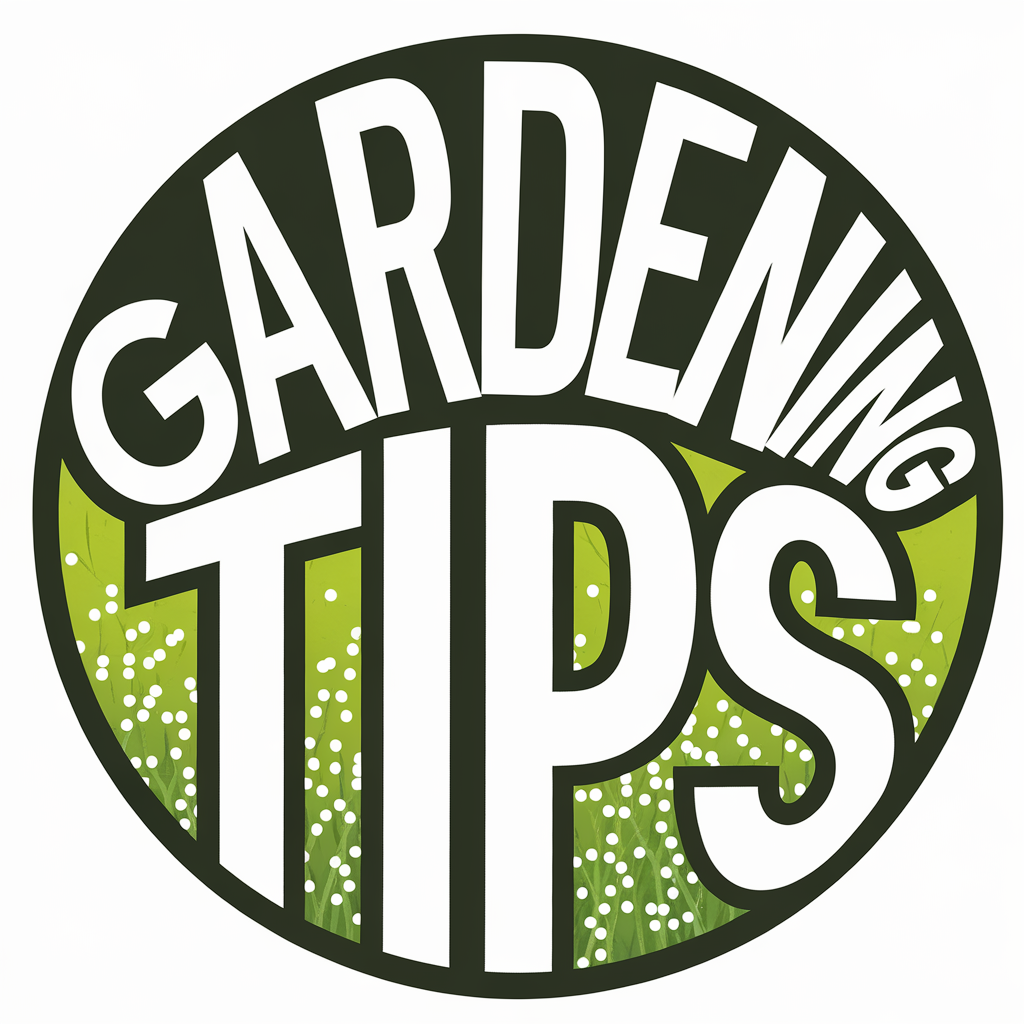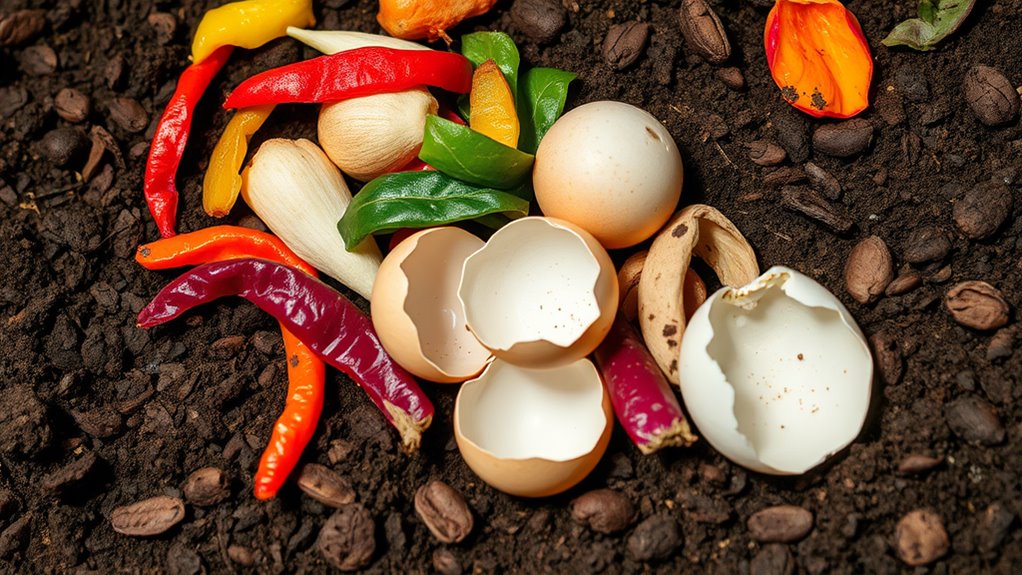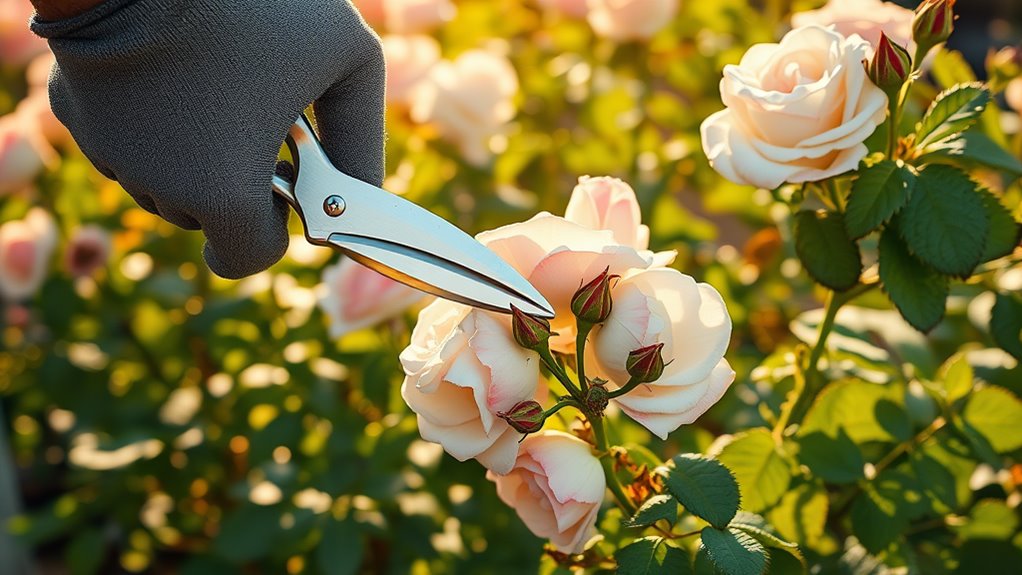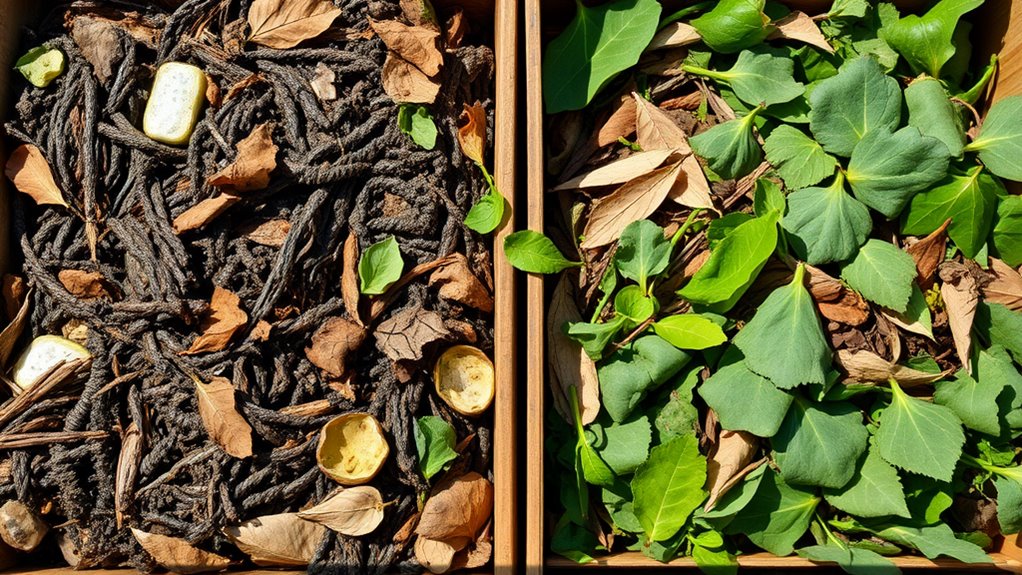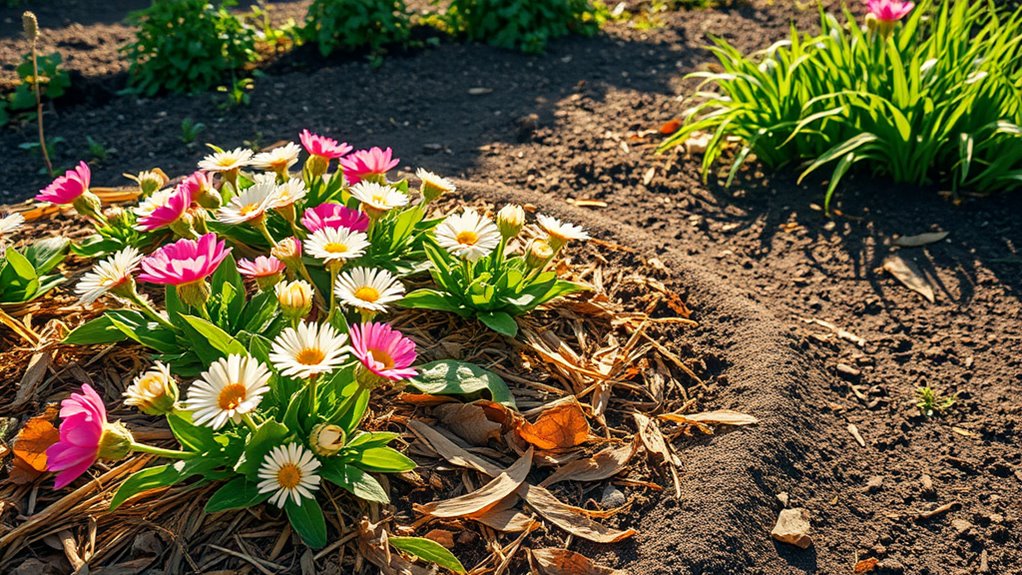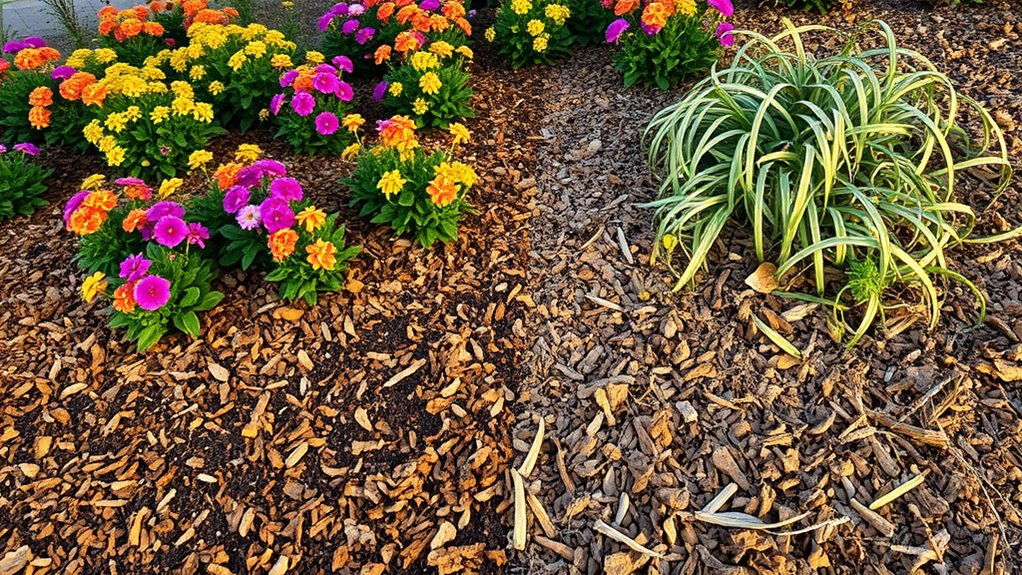Don’t Throw These Away – Your Garden Will Love Them!
Don’t throw away your kitchen scraps like vegetable peels and coffee grounds—they’re treasures for your garden. You’ll enrich soil by composting them with garden waste such as leaves and grass clippings, creating nutrient-packed amendments that boost fertility and retain moisture. Repurpose eggshells for calcium to strengthen plants and deter pests. Explore these simple techniques further to transform everyday waste into a thriving garden ally.
Key Takeaways
- Turn kitchen scraps like vegetable peels and coffee grounds into nutrient-rich compost for healthier garden soil.
- Repurpose garden waste, such as fallen leaves and grass clippings, to boost soil fertility and retain moisture.
- Use coffee grounds to add nitrogen to your garden, benefiting acid-loving plants and suppressing weeds.
- Crush eggshells for calcium, which strengthens plant roots and prevents issues like blossom end rot.
- Regularly turn your compost pile to accelerate decomposition and create nutrient-packed soil amendments.
Kitchen Scraps for Nutrient-Rich Soil
Many kitchen scraps, like vegetable peels and coffee grounds, can quickly enrich your soil with essential nutrients.
To apply organic composting tips effectively, you collect items such as eggshells for calcium and banana peels for potassium, chopping them finely to speed decomposition.
Build your compost pile by layering these greens with browns like shredded paper, maintaining a moist, airy environment.
Turn it regularly to promote microbial activity and prevent clumping.
You’ll create nutrient-dense compost that revitalizes your garden beds naturally, fostering healthier plants without synthetic additives.
Monitor pH levels for optimal results.
Additionally, this method can significantly boost soil fertility by recycling organic matter back into the ecosystem.
This simple composting technique transforms kitchen scraps into nutrient-rich compost, enhancing your garden’s health and sustainability.
Garden Waste That Enhances Fertility
As you tend your garden, the waste from pruned branches, fallen leaves, and grass clippings becomes a powerful tool for boosting soil fertility.
Start by shredding branches to accelerate decomposition and mix them into beds for added structure.
Fallen leaves, rich in organic matter, form excellent mulch that retains moisture and prevents erosion while slowly releasing nutrients.
Grass clippings provide a nitrogen surge; spread them thinly to avoid clumping and integrate them into the topsoil.
This method enhances microbial life, improves texture, and sustains long-term fertility without chemical inputs, making your garden thrive naturally.
For busy individuals, low-effort composting enables you to turn garden waste into nutrient-rich soil enhancers with ease.
To further enhance soil health, consider adding kitchen scraps like fruit peels and vegetable trimmings to your composting routine for additional nutrient enrichment.
Composting Fruits and Vegetables Effectively
Composting fruits and vegetables turns your kitchen scraps into nutrient-rich soil amendments that boost garden health.
You’ll start by collecting items like banana peels, apple cores, and carrot tops, then balance them with brown materials such as leaves or paper to prevent odors.
Chop larger pieces to speed up decomposition, and maintain your pile at 60-70% moisture by watering lightly.
Turn it weekly to aerate and promote even breakdown, typically taking 2-6 months.
This process creates fertile compost that enriches soil, suppresses diseases, and helps your plants thrive sustainably. Additionally, banana peels from your scraps can serve as banana peel fertilizer to further nourish your garden plants.
To further enhance your composting process, consider ingredient swaps for richer soil and more efficient decomposition.
Repurposing Coffee Grounds in Your Garden
Coffee grounds, often discarded after brewing, offer a simple way to enrich your garden’s soil.
They’re packed with nitrogen, boosting microbial activity and plant growth. You can mix them into your compost pile to speed up decomposition or sprinkle them around acid-loving plants like roses and tomatoes to adjust soil pH. This repels pests such as slugs and ants naturally.
For optimal use, apply a thin layer as mulch to retain moisture and suppress weeds, but avoid overapplication to prevent acidity buildup.
Always test your soil first for balance.
To maximize benefits, combine coffee grounds with easy organic fertilizer recipe for even stronger plant growth. Additionally, integrating coffee grounds into your easy composting routine can help produce nutrient-rich soil for better garden results.
Eggshells as a Natural Garden Booster
While you might overlook them as mere kitchen scraps, eggshells pack a calcium punch that strengthens plant roots and wards off issues like blossom end rot. This approach embodies sustainable practices by utilizing kitchen waste as a homemade alternative to chemical fertilizers.
To use them effectively, rinse the shells to remove residue, dry them thoroughly, and crush into a fine powder for quick soil integration.
You’ll enhance nutrient uptake in vegetables such as tomatoes and peppers by mixing shells into planting holes or sprinkling around stems. This boosts soil pH slightly and deters pests naturally.
Apply consistently for optimal results, turning waste into a free, eco-friendly garden amendment that promotes vigorous growth.
Additionally, eggshells align with backyard solutions for improving soil quality using natural, no-cost materials from your own backyard.
Using Leaves and Grass for Mulch
Leaves and grass clippings offer a simple, effective way to mulch your garden, turning yard waste into a protective layer that conserves soil moisture and suppresses weeds.
You’ll start by gathering dry leaves and fresh clippings, shredding them to prevent matting and speed decomposition. Spread a 2-4 inch layer around your plants, keeping it away from stems to avoid rot.
This boosts soil temperature, enriches it with organic matter, and reduces watering needs. Regularly replenish the mulch in fall or spring for optimal results, creating a healthier, low-maintenance garden effortlessly. This method also helps in keeping your garden consistently moist and thriving throughout the growing season. Additionally, using this approach enhances pest control by forming a barrier that discourages harmful insects.
Simple Ways to Make Compost at Home
You gather organic waste like fruit peels, coffee grounds, and yard clippings to kickstart your compost pile.
Then, build a simple compost bin using everyday materials such as wooden pallets or a plastic container to keep it contained and organized.
Regularly turn the pile with a pitchfork to mix in air and accelerate the breakdown into nutrient-rich soil.
Gather Organic Waste
Gathering organic waste forms the foundation of home composting, turning everyday scraps into nutrient-rich soil.
You can start by collecting kitchen items like fruit peels, vegetable trimmings, coffee grounds, and eggshells, which provide essential nutrients. From your yard, gather leaves, grass clippings, and plant debris for added carbon.
Use a simple, lidded container to store these materials temporarily, keeping them separate from non-compostables. Aim for a mix of “green” wet wastes for nitrogen and “brown” dry ones for balance.
Avoid meat, dairy, and oily foods to prevent pests and odors, ensuring a clean collection process. This habit builds a steady supply for your composting journey.
Build Compost Bin
Once you’ve gathered your organic waste, building a simple compost bin becomes the next essential step for effective home composting.
For a basic DIY option, gather materials like chicken wire, wooden pallets, or a large plastic bin. Start by choosing a level, shady spot in your yard for good drainage.
If using wire, shape it into a 3-foot diameter cylinder and secure with stakes for stability. For pallets, assemble them into a square frame, at least 3 feet high, and attach a removable front for easy access.
Add drainage holes if needed and top with a lid to keep it contained. This setup ensures efficient decomposition while being affordable and straightforward to build.
Turn the Pile
Turning your compost pile regularly is key to speeding up decomposition and ensuring even breakdown of materials. To do this effectively, grab a pitchfork or shovel and mix the outer layers into the center, incorporating air and moisture for optimal results.
Aim to turn it every 7-10 days, especially in warmer weather, as this boosts bacterial activity and prevents compaction. You’ll notice the pile heating up, a sign of healthy breakdown; keep it damp but not waterlogged.
This simple habit accelerates the process, turning kitchen scraps and yard waste into rich, nutrient-packed soil for your garden beds. Monitor for balance—if it smells, add more browns like leaves.
